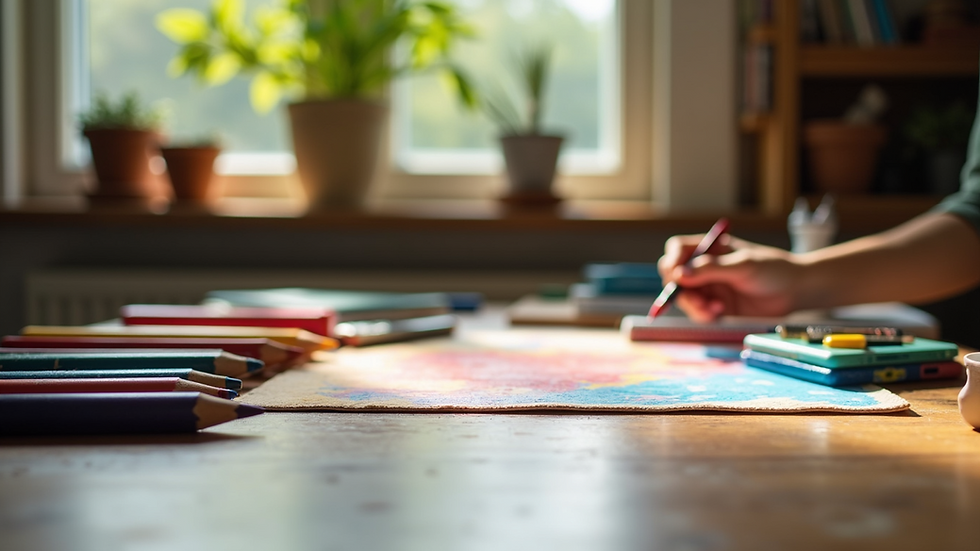A Summer of Creativity for Aspiring Young Artists
- Natalia
- Aug 29, 2025
- 4 min read
Summer is the perfect time for young artists to explore their creativity and develop new skills. Art camps offer a unique opportunity for children and teens to immerse themselves in a world of colors, shapes, and imagination. These camps provide a structured yet fun environment where aspiring artists can learn, experiment, and grow. Whether your child is a beginner or has some experience, summer art camps can ignite their passion and boost their confidence.
Why Choose Art Camps for Summer Creativity?
Art camps are designed to nurture creativity in a supportive setting. They offer more than just painting or drawing lessons. Campers engage in various activities such as sculpture, printmaking, digital art, and even performance art. This variety helps young artists discover their favorite mediums and styles.
Benefits of attending art camps include:
Skill development: Campers learn new techniques and improve their artistic abilities.
Social interaction: Kids meet peers with similar interests, fostering friendships.
Confidence building: Completing projects and receiving positive feedback boosts self-esteem.
Creative problem-solving: Art encourages thinking outside the box and experimenting.
Stress relief: Artistic expression is a healthy outlet for emotions and energy.
Parents often look for art camps that balance instruction with fun. Many camps also include field trips to galleries or outdoor sketching sessions, enriching the experience.

Exploring Different Types of Art Camps
There is a wide range of art camps available, each catering to different interests and age groups. Some camps focus on traditional arts like drawing and painting, while others incorporate modern techniques such as digital design or animation.
Traditional Art Camps
These camps emphasize foundational skills such as:
Drawing with pencils, charcoal, and pastels
Watercolor and acrylic painting
Clay modeling and pottery
Printmaking and collage
Traditional camps are ideal for beginners who want to build a strong base in classic art forms.
Specialized Art Camps
For campers with specific interests, specialized camps offer focused instruction in areas like:
Graphic design and digital illustration
Photography and photo editing
Animation and stop-motion filmmaking
Fashion design and textile arts
These camps often use technology and software, preparing young artists for future creative careers.
Mixed Media and Experimental Camps
Some camps encourage mixing different materials and techniques. Campers might combine painting with sculpture or use recycled materials to create eco-friendly art. This approach fosters innovation and helps kids think creatively about art.
If you are searching for quality programs, try looking up art camps near me to find local options that fit your schedule and interests.

How to Choose the Right Art Camp
Selecting the best art camp for your child involves considering several factors:
Age and Skill Level
Make sure the camp offers age-appropriate activities and instruction. Some camps divide groups by age or skill to provide tailored learning experiences.
Camp Duration and Schedule
Camps vary from one-day workshops to multi-week programs. Choose a schedule that fits your family’s summer plans and your child’s attention span.
Instructor Qualifications
Experienced instructors with art education backgrounds can provide better guidance and encouragement.
Facilities and Materials
Check if the camp provides all necessary materials or if you need to bring supplies. Well-equipped studios and outdoor spaces enhance the creative process.
Reviews and Recommendations
Look for testimonials from other parents and campers. Positive feedback often indicates a well-run program.
Cost and Location
Consider your budget and the camp’s proximity. Convenient locations reduce travel time and make drop-offs easier.
By evaluating these aspects, you can find a camp that offers a rewarding and enjoyable experience.
Activities to Expect at Summer Art Camps
Art camps are packed with engaging activities that keep young artists motivated and inspired. Here are some common examples:
Daily art projects: Each day focuses on a new theme or technique.
Group collaborations: Campers work together on murals or installations.
Art history lessons: Brief introductions to famous artists and movements.
Outdoor sketching: Drawing from nature to develop observation skills.
Art shows: End-of-camp exhibitions where campers display their work.
Creative games: Fun exercises to stimulate imagination and teamwork.
These activities help campers develop a well-rounded understanding of art and build lasting memories.

Encouraging Creativity Beyond Camp
The benefits of art camps extend well beyond the summer months. Here are some tips to keep the creative spirit alive at home:
Create a dedicated art space: Set up a corner with supplies where your child can freely create.
Visit local galleries and museums: Inspire your child by exploring different art styles.
Encourage daily sketching: Even a few minutes a day can improve skills.
Provide diverse materials: Offer various tools like markers, clay, and fabric.
Celebrate their work: Display finished pieces around the house to boost pride.
Enroll in follow-up classes: Look for after-school programs or weekend workshops.
By supporting ongoing creativity, you help your child develop lifelong artistic habits and confidence.
Summer art camps are a wonderful way for young artists to explore their talents, make new friends, and have fun. Whether your child dreams of becoming a painter, designer, or animator, these camps provide the perfect environment to grow. Start planning now to give your aspiring artist a summer full of creativity and inspiration.





Comments